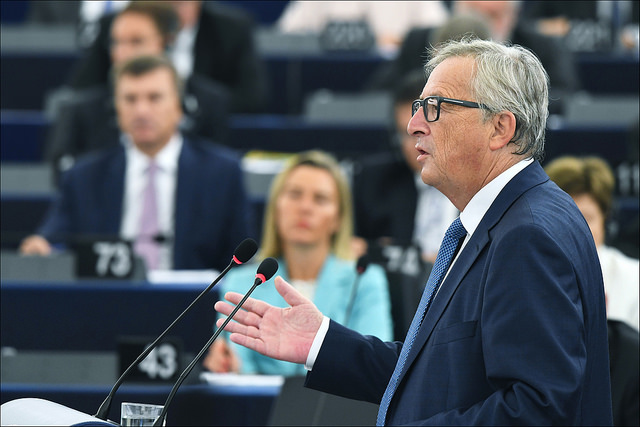
There are various ways to try to halt the rise of xenophobic and anti-European populism. One way, clearly, is to stem the causes of their growth: helping the people who have lost out from the recent crisis and from globalisation, addressing the security and identity issues that have proliferated with the jihadist attacks in Europe and, in general, tackling the problems that concern citizens. The general discourse of political leaders can carry weight. It can be brave or courageous, championing democratic and liberal values (in the original sense of liberal), the recognition of the ‘other’, providing asylum in an orderly way and fostering interculturality. Or it can allow itself to be contaminated by populism, adopting some of the latter’s precepts.
The informal summit (it could hardly be anything else without the UK) of the 27 in Bratislava has shown that the EU has still not pieced together its broken crockery, and nor has it decided upon a promising new collective future. Some days previously the President of the European Commission, Jean-Claude Juncker, delivering his State of the Union speech in the European Parliament, had acknowledged a certain degree of European and even personal failure by declaring that ‘in our incomplete Union, there is no European leadership that can substitute national leadership’. But he produced a string of proposals that were much more grounded than the year before, albeit still hampered by an excessively technocratic slant and lack of clarity about the future. Meanwhile, in his letter on the eve of Bratislava, the President of the European Council, Donald Tusk, who requested ‘brutal honesty’ in the Slovakian capital, showed himself to be more pessimistic. He wanted to prevent the EU being more disunited at the conclusion of the meeting than at its commencement. He succeeded, but at the expense of kicking the can down the road, towards a general pact, a new route map, to commemorate the 60th anniversary of the Treaty of Rome next March. For the time being, the emphasis of the final declaration is on internal and external security and a token gesture towards young people. But they should also have paid more attention to all long-term unemployed, and those who only get insecure and poorly paid jobs, while the refugee issue has been hidden under the carpet.
An instance of brave discourse is provided by the German Chancellor, Angela Merkel, described by The Financial Times as ‘indispensable but insufficient’; after her Christian Democrat party was defeated in her own Land, Mecklenburg-West Pomerania –where it trailed behind the AfD, the anti-immigration and anti-European Alliance for Germany– rather than allowing herself to be swept away by such currents she defended an open Europe and an open Germany. For Merkel, sensible politicians –as opposed to populists, ‘who are uninterested in solutions’– ‘have the responsibility to moderate our discourse. If our words and actions were to tend in the same direction as those who are uninterested in offering solutions, we’d lose our bearings’. Merkel pointed out that ‘terrorism is not a new problem that arrived with the refugees’. Granted, what the EU has done with the collaboration of Turkey, albeit with some countries refusing to pull their weight –apart from some sharing of the financial burden– has helped Merkel defend her stance. Her government estimates that this year it will receive some 300,000 asylum seekers, compared with more than a million last year.
Merkel acknowledged in a speech to Parliament that voters’ concerns ‘well- or ill-founded, should be taken seriously [by] all of us in this chamber’. She makes regular appearances in both Parliament and the television studies, even to explain her position after a regional election. She announced she was ‘reasonably sure that, if we resist this and we face up to the truth, we’ll all win (…) and thus recoup the most important thing we need: the people’s trust’.
Last Sunday, in the elections in the Land-City of Berlin, the CDU continued to fall as Merkel’s speech had not stopped the bleeding, and the AfD entered the regional parliament. And after the drubbing in these elections, Merkel has been forced to change her discourse and to recognize that she was wrong not calibrate well the difficulties posed by the massive influx of refugees, moving away from the famous phrase ‘Wir Schaffen das’ (we can do it). Even before this, her Bavarian partners in the CSU had called for predominantly Christian immigration, and in the governing coalition, the Minister for Economic Affairs, Sigmar Gabriel, had distanced himself from the TTIP (Transatlantic Trade and Investment Partnership, currently being negotiated).
A different example is provided by the socialist President, François Hollande, and his Prime Minister, Manuel Valls, who this summer supported some Mayors’ banning of so-called burkinis on their beaches, a move subsequently rejected by the Council of State. Also implicated in this discourse –contaminated by the National Front– is the former President, Nicolas Sarkozy, an aspiring republican (centre right) candidate in the primaries for the next presidential elections. His main rival, Alain Juppé, takes a much more moderate approach, seemingly uncontaminated by Le Pen –in a country severely hit by jihadism, granted, but with almost five million Muslims, most of them of French nationality and born in France–.
From outside the EU, but almost as if it were part of it, from Norway, where a xenophobic movement has grown up, the habitually discreet King Harald V, in a short speech delivered at a recent palace garden party in front of the prime minister and other dignitaries, explained how his grandparents arrived from Denmark and England 110 years earlier. And he declared: ‘Norwegians are girls who love girls, boys who love boys, and girls and boys who love each other. Norwegians believe in God, Allah, the Universe and nothing’.
‘My greatest hope for Norway’, continued the King, ‘is that we will be able to take care of one another. That we will continue to build this country, on a foundation of trust, fellowship and generosity of spirit. That we will feel that we are –despite our differences– one people. That Norway is one’. They are words that have had great impact far beyond his borders.
As Federico Steinberg has rightly pointed out, in the wake of the G-20 summit in Hangzhou, where various leaders acknowledged the recent public rejection of globalisation, various openly pro-globalisation directors of international institutions have called on politicians to do something for those left behind by the crisis and by globalisation. Mario Draghi, President of the European Central Bank, called on the institutions of the EU to put more effort into redistribution, inequality, employment and the insecurity of those that find work, to counteract the populists. The head of the International Monetary Fund, Christine Lagarde, made a similar remark when she spoke of the need to ‘make globalisation work for all’.
Is change afoot? It may seem so. It is important not to remain silent in the face of its opponents when the time comes to defend Europe, even if this entails ‘another’ Europe, because Europe has got to change. But as Merkel is experiencing, the speech of courage is no guarantee of success.


